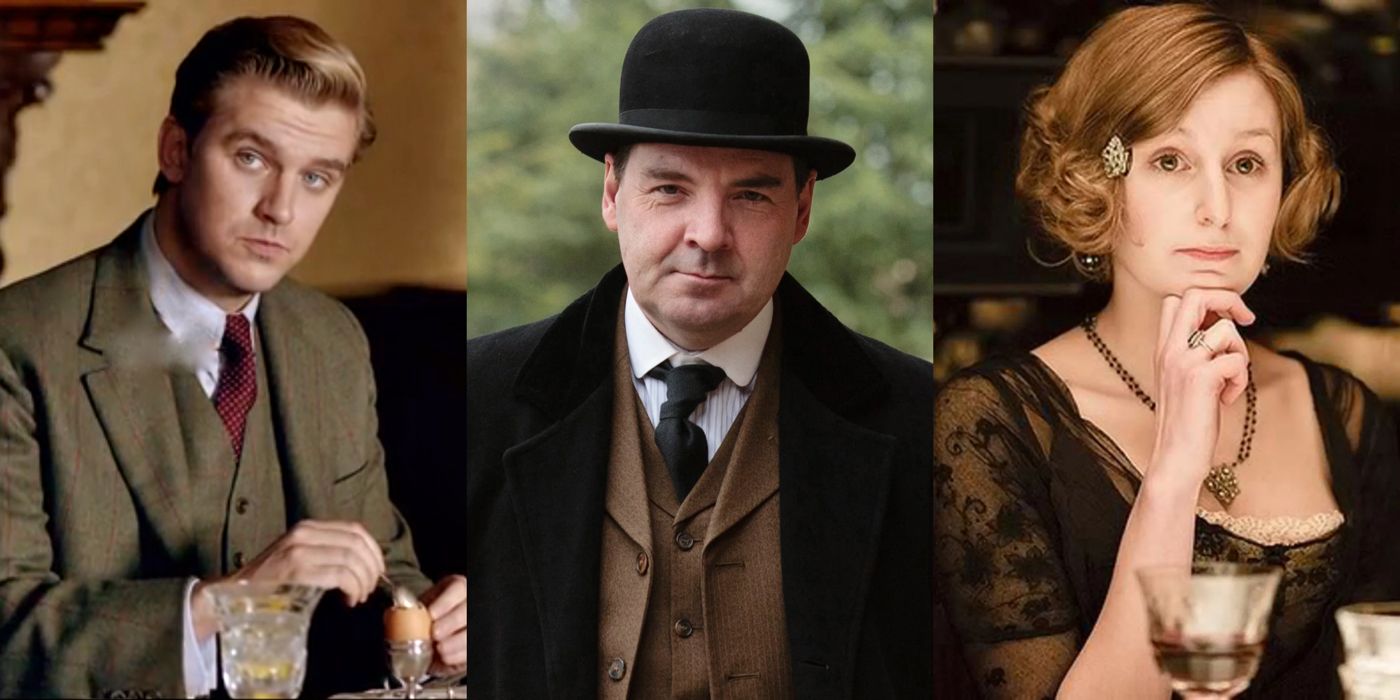Much to the delight of fans, Downton Abbey: A New Era recently took to cinema screens to deliver another enthralling instalment of the period drama. Whilst the movie stepped into a different time, Downton Abbey also experienced plenty of changes over its six seasons. Several of those story shifts showed off the show’s flaws, rather unintentionally. On the other hand, these were changes that fans could ignore for the sake of the show and its good points.
Actors wanting to leave the show couldn’t be helped, and the problems behind shooting to an actor’s schedule were also issues that couldn’t be avoided. However, the writing covering up those issues was occasionally less-than-stellar. Fans ignored certain writing changes if the story around them was compelling enough.
John Bates And His Unusually Dramatic Storylines
John Bates probably should have been revealed as something strange by the end of the series, considering the sheer amount of wacky shenanigans that happened to him. The various plots attributed to Bates are a flaw that most people jump over, preferring to think of him and Anna as happily ensconced in a peaceful world.
However, plenty of strange stuff happened: his ex-wife purposefully sent him to jail, he was incorrectly accused of murder twice, the list goes on. It seemed unrealistic that all of these momentous, and incredibly dramatic, events would happen to a person as demur and boring as John. Ultimately, it wound up being to the fans’ delight when John and Anna did get their happily ever after, even if they had to go through seasons of weirdness to get there.
Michael Gregson Disappears For Years
This was a real-world problem that got exacerbated on the show. The actor playing Gregson, Charles Edwards, had other projects he needed to make time for, and couldn’t be in as much of Downton Abbey as Julian Fellowes was hoping for. Therefore, after a few years of being missing in Germany in-universe, Gregson was killed off, rather unceremoniously.
His sudden death puts an end to Edith’s romantic hopes of a future with him (one of Edith’s sadder storylines in Downton Abbey, all told), but it also wraps up a long-running plot hole. On the other hand, fans overlooked it because it was a relief to finally have an answer as to what had happened to Michael Gregson.
Mary And Edith’s Protracted Rivalry
Even at the beginning of season 1, Mary and Edith’s rivalry is already a bit over-the-top. Mary jibes Edith for grieving the death of their cousin Patrick, who is actually her fiance. Several seasons of sibling rivalry proceed to occur, including some genuinely hurtful metaphorical backstabbing from each sister for perceived wrongs (such as Edith’s letter about Pamuk dying in Mary’s bed).
The rivalry keeps going throughout the entire series, despite the fact that these women are growing up and, one would think, out of such childish actions. On the other hand, it’s a fundamental part of the show, and fans can forgive that.
Season 2’s Time Skips
Season 2 takes on the Great War – also known as World War I. Due to the war’s length, the series also incorporates massive months-long time skips. This wouldn’t be bad in of itself, except that the characters seem to be unaware of them, leading to a lot of scenes where conversations are picked up months later with no indication of time passing.
It’s as if just a few moments have passed instead, so the conversation continues normally despite the time in-between. For fans who still enjoyed the storylines of season 2, despite the addition of the war, this was something they were able to look past.
Lack Of Matthew After Season 3
According to Hello! Magazine, Dan Stevens’ exit on Downton Abbey was not amicable, and as a result, Matthew is hardly mentioned in the last three seasons. Mary ends up having to deal with multiple new suitors, and eventually chooses one of them. She also must grieve for Matthew, one of the saddest things Mary’s had to do in Downton Abbey.
On the other hand, the restructuring can also make it seem like a completely different show. Shows occasionally need to evolve to keep their audience, and with Stevens’ leaving anyway, maybe it was time for the show to go in a different direction, even if that was a partial pivot back towards romance.
Edith As A Mother
Edith and her aunt Rosamund go to Switzerland so she can have her baby privately. Edith can’t let Marigold go, so brings her back to England to live with local tenants, the Drewes. Eventually, she decides she can’t even live with that and takes Marigold away from the Drewes to be her ward.
Edith’s decision is perplexing as it makes her out to be selfish and uncaring toward others, two traits that just aren’t in her character. She never considers the effect this will have on the Drewes or on Marigold herself. Despite being young, she is still taken from the only family she’s ever known. Fans can easily overlook this due to the enjoyment of Edith reuniting with her daughter, but it’s a flaw that nonetheless weakens the integrity of a central character of the show.
Robert’s Money Failure And Matthew’s Internal Conflict
Around the start of season 3, Robert finds out that the money he invested in the Grand Trunk Railway – almost the entire fortune of the estate and Cora – has been lost. Matthew (Dan Stevens) then learns that he has come into a great deal of money from Mr. Swire. Despite the solution being obvious, Matthew hems and haws over what to do with the money, feeling wrong about using it for the estate.
This isn’t a bad plot point per se, it’s just so obvious what is going to happen before it ends that it feels tedious and not very realistic as a Downton Abbey storyline. Luckily, there’s also a wedding in this episode for the audience to focus on.
Too Many Love Stories
The relationships and possible relationships between all the downstairs staff (barring Anna, Bates, and the more grown-up characters) eventually get so complicated that they essentially become hard to keep track of and stretched the limits of what was realistically possible in an upper-class manor at the beginning of the 20th century.
It’s not surprising that the romances got cleaner when actors such as Ed Speelers eventually left the show. It also made things easier on the audience, who didn’t have to remember so many similar storylines and could still be persuaded that the show was believable in its depictions of love affairs in a refined English mansion.
Occasional Period Blunders
While being a period piece, Downton Abbey was written in the 2000s, meaning it isn’t entirely accurate in regard to costumes and slang. Occasionally there are some slip-ups, such as Sybil saying she “couldn’t care less”about money over love. According to Babbel.com, this phrase is anachronistic and hadn’t entered the popular lexicon just yet.
In the long run, linguistical changes are minor and are therefore the easiest of the show’s flaws to overlook. It can definitely be easier to watch a period piece if the dialogue is modernized, just a bit.
Robert’s Affair
During the Spanish Flu while his wife is ill, Robert has a random affair with a housemaid, Jane. It’s a very strange characterization choice and never goes anywhere or is brought up again after it happens. It seems like the affair might be showing just how much Robert loves Cora, but nothing really comes of this plot, so it almost doesn’t matter.
In addition, the affair is pointless as Robert has shown his love for his wife in many ways throughout the show’s run. It’s a strange writing decision that fans can completely ignore because nothing happens because of or after its existence in the series.
About The Author



























































